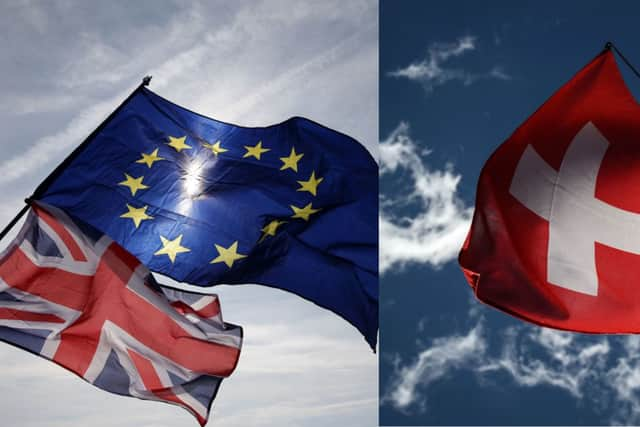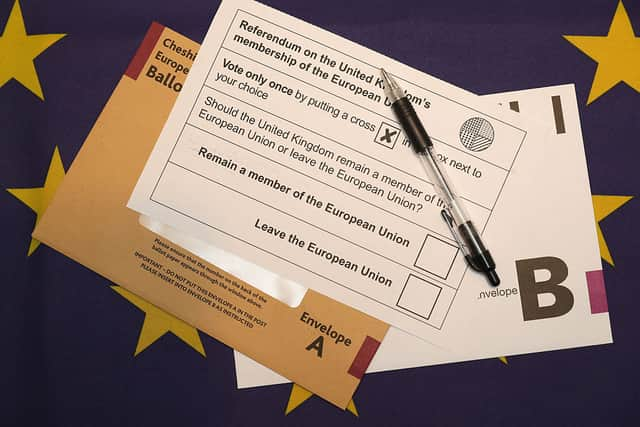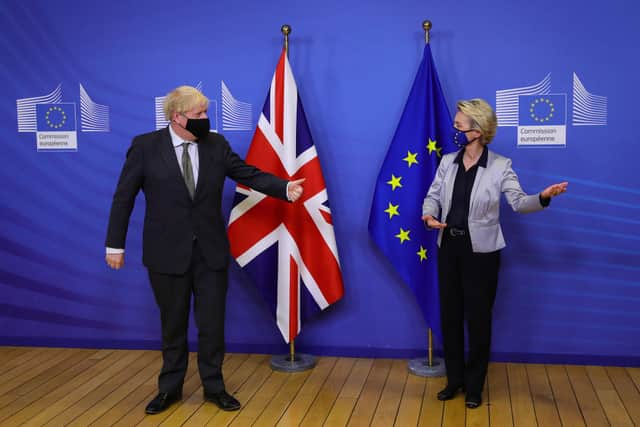Brexit: does UK want Swiss-style deal with EU, what would it look like, what’s been said about trade deals?
and live on Freeview channel 276
Downing Street has slammed reports that Rishi Sunak’s government is attempting to secure the UK a Swiss-style relationship with the EU post-Brexit as “categorically untrue”.
It comes after the Sunday Times reported that senior government officials were vying for closer relations with the EU as part of attempts to tackle the current barriers to trade. According to the paper, some MPs suggested that in order to achieve a frictionless trading relationship, it would be necessary to mirror the ties that Switzerland has with the union.
Advertisement
Hide AdAdvertisement
Hide AdBut the alleged change of heart by the Conservative Party, just a few years after former Prime Minister Boris Johnson secured a deal with the EU after a series of back-and-forth negotiations, has been denied.
A government spokesperson said: “This government is focused on using our Brexit freedoms to create opportunities that drive growth and strengthen our economy. Brexit means we will never again have to accept a relationship with Europe that would see a return to freedom of movement, unnecessary payments to the European Union, or jeopardise the full benefit of trade deals we are now able to strike around the world.” The spokesperson also labelled the story “categorically untrue”.
A move towards a Swiss-style relationship for the UK would likely cause a rehash of the Brexit-related debates which the country and the government has struggled with over the past six years. It would also likely anger backbench Tories in Westminster, many of whom are hardline Brexiteers.
But what exactly was suggested about new trading ties with the EU, and what sort of relationship does Switzerland have with the union? Here’s what some key government figures have said - and what ‘Swiss-style’ ties would look like for the UK.


What relationship does Switzerland have with the EU?
Advertisement
Hide AdAdvertisement
Hide AdSwitzerland is not a member of the EU, but due to a series of bilateral agreements it is the union’s fourth biggest trading partner and has a close economic relationship with the 27 member states.
As part of its agreement, the country has selective access to the EU’s single market. This means, in order to ensure the smooth trade of goods across borders, all documentary checks, all identity checks, most physical checks, and most veterinary certificates are removed.
Other benefits include the fact that Switzerland is signed up to the Schengen free travel zone, which allows for the free movement of people, and it participates in EU research and education programmes. It is also worth mentioning that Switzerland contributes to the union’s budget.
One of the more complicated aspects of the relationship is that Switzerland has to accept package deals from the EU to obtain these agreements, which may include elements of legislation it has been opposed to as a country.
Advertisement
Hide AdAdvertisement
Hide AdAccording to ‘UK in a Changing Europe’, every bill presented to the Swiss federal parliament has to be examined for compatibility with EU law. The think tank added that the EU “dislikes the Swiss model because of its complicated governance and lack of enforcement and has been trying to negotiate a more streamlined arrangement.”


Why would the UK consider this sort of relationship with the EU?
Discussions of the effects of leaving the EU - and of what sort of relationship the UK would have with the union - quickly subsided after the country’s departure date of 31 January 2020 as attention turned to Covid-19. Some thought economic focus could shift back to Brexit once the pandemic calmed down, but concentration instead turned towards the fallout from Russia’s invasion of Ukraine and issues with energy supply.
Brexit only really became a talking point again after Liz Truss and Kwasi Kwarteng’s mini budget sparked market turmoil, leaving the UK in another period of economic stability. Therefore, since businesses are already struggling due to the cost of living crisis, the fact that they are also facing difficulty with importing goods or trading with Europe has put fresh scrutiny on Johnson’s trade deal.
In fact, Chancellor Jeremy Hunt admitted in the past week that the former Prime Minister’s deal had caused damaging trade barriers with the EU. He insisted that the UK would find a way to improve trading ties without joining the single market, which led to now-denied reports that some MPs were looking towards a deal inspired by Switzerland - but without the return to freedom of movement.
Advertisement
Hide AdAdvertisement
Hide AdA Swiss-style agreement was previously suggested by those at the EU, with Brussels’ Brexit negotiator, Maroš Šefčovič, offering one last June. However, led by former chief negotiator Lord David Frost, the UK rejected the suggestion because it required regulatory alignment. This meant Brexit border checks on red meat, poultry, mince, fish and dairy continue on food entering Northern Ireland from Great Britain.


What else was said about the reports?
When asked about the reports in broadcast interviews, Health Secretary Steve Barclay insisted he did not recognise them. He told Sky News’ Sophy Ridge: “We’ve got a Prime Minister who himself supported Brexit. I myself did and was Brexit Secretary, and worked very hard to maximise our control of our laws, our borders and our money.
“So, it’s absolutely important, particularly in those high-growth sectors, such as financial services, life sciences and the green industries, that we really use the Brexit freedoms we have. So, I don’t recognise this story at all.”
He also added that he could not support a Swiss-style relationship because he wants to “maximise the opportunities” that Brexit offers to the UK.
Advertisement
Hide AdAdvertisement
Hide AdSimon Clarke, the former levelling up secretary, was also among those to criticise the idea, writing on Twitter: “I very much hope and believe this isn’t something under consideration. We settled the question of leaving the European Union, definitively, in 2019.” Meanwhile, Lord Frost tweeted that he hoped, if the report was correct, “the government thinks better of these plans, fast”.
Shadow work and pensions secretary Jonathan Ashworth told Sky News that Labour does not want to rejoin the EU single market nor would it seek to adopt a Swiss-style set of arrangements. He said: “We’re not proposing returning to the single market or the customs union, or anything like that. But we do want to negotiate a bespoke deal for the United Kingdom, so that our businesses can export, so that we can get those agreements on agriculture, so we can work together on security issues.”
What is currently happening between the EU and the UK?
The UK is still locked in long-running talks with the EU over the Northern Ireland Protocol, a post-Brexit arrangement for the region designed to avoid a border on the island of Ireland.
Unionists have opposed the protocol as impeding trade between Northern Ireland and Great Britain, placing a border in the Irish Sea. This has resulted in the collapse of the Stormont Assembly, with top civil servants left to run government departments.
However, there have been renewed hopes in recent weeks that a deal can be secured and that the relationship improved between the UK and the EU after years of tensions.
Comment Guidelines
National World encourages reader discussion on our stories. User feedback, insights and back-and-forth exchanges add a rich layer of context to reporting. Please review our Community Guidelines before commenting.
